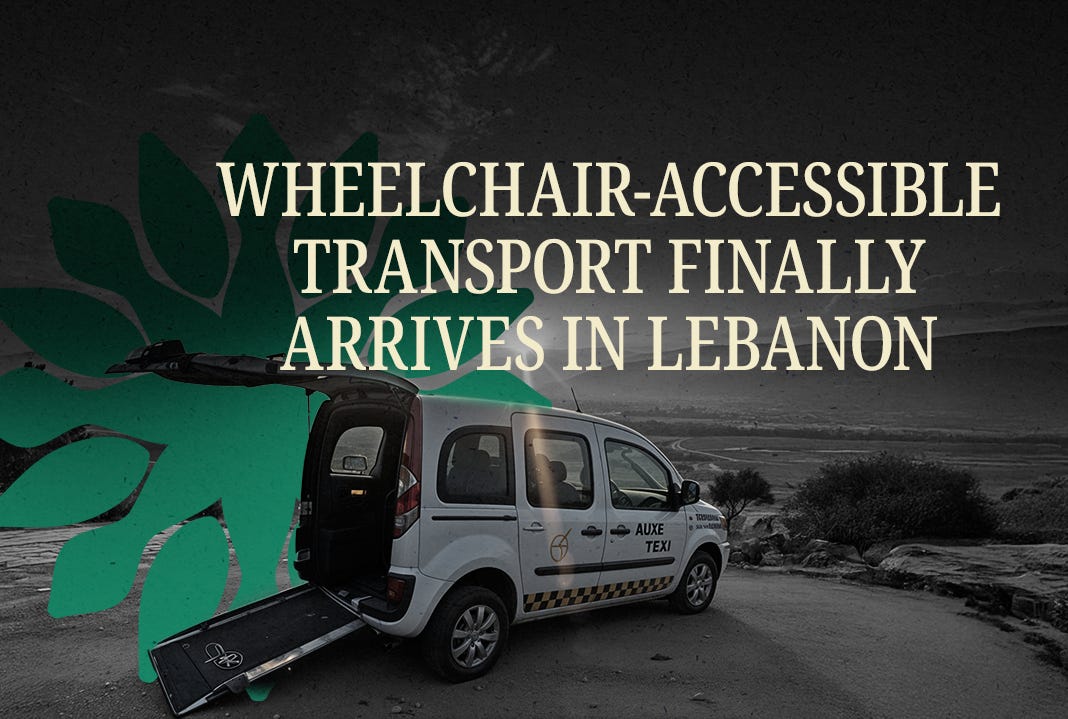Wheelchair-Accessible Transport Finally Arrives in Lebanon
A devastating accident showed Paul Debs what Lebanon lacked. Now he's filling the gap himself to give the disabled community its mobility back.
“The smooth, wide pathways of the Corniche are wheelchair-friendly, allowing for easy navigation,” touts one travel website reporting on accessible tourism in Lebanon. Meanwhile, the Beirut Souks, a popular tourist attraction, feature elevators and ramps, ensuring ease of movement. What’s unclear is how wheelchair users can reach these destinations in a country where transport systems rarely cater to people with disabilities.
“I didn’t realise how much is lacking for people with disabilities in Lebanon till I had my accident,” says Paul Debs, 35, who has been a wheelchair user for 14 years.
Tired of seeing people with disabilities miss out, he decided to launch a specialized hire car service equipped for wheelchairs. “My goal is to better serve the community. People with disabilities feel safe knowing they have reliable transportation options that cater to their needs, which can greatly enhance their independence and quality of life,” he says.
Formerly a professional diver, Debs was swimming in the river when he had his accident. An awkward twist while landing a dive snapped his neck, and a friend's attempt to help unintentionally exacerbated the injury.
One of the most challenging adjustments to life in a wheelchair was transport. Taxis are often the only option, but even this requires two people to carry him in and out of the car at either end. That’s why Debs decided to start Able Taxi, which features a fully equipped car that enables wheelchair users to travel safely and independently.
“I remember how much I used to worry about getting a taxi somewhere,” says Debs,
who took out a loan to supplement his savings for the business. It was a risk—any startup in Lebanon’s stumbling economy faces considerable challenges, but bookings came quickly, and now he struggles to meet rising demand.
More than 900,000 people are living with disabilities in Lebanon, yet much of the country remains off-limits, particularly to those with mobility issues. Few buildings, including offices, schools, and universities, have ramps or lifts, despite a 2000 law securing education and employment rights for people with disabilities.
According to UNDP, “they contend with a systemic lack of provisions for rights, resources, and services and experience widespread marginalization, exclusion, and violence at home and outside.” Even voting can be a challenge, with polling stations rarely accessible to wheelchair users.
“I can’t go to restaurants because I would need to be carried upstairs. There aren’t even basic public services—it makes things much more difficult for people with disabilities,” says Debs.
Working in recruitment, he sees firsthand how limited the job pool is for people with additional needs. Only occasionally does his firm manage to find the right roles. “I try as much as possible to help people with disabilities find a job, but no company is properly equipped,” he adds.
The Israel-Hezbollah war has intensified challenges as bombs pummel residential areas, displacing people from their homes. “Persons with disabilities have been gravely affected by these dynamics, living in inadequate housing, lacking essential services and access to livelihoods, and often, during displacement, are left behind," French independent aid group Handicap International said in an October report.
Debs lives in the Bekaa Valley, where 12 people were killed in a single wave of strikes in July, marking the deadliest attacks on the area since a US-brokered ceasefire between Lebanon and Israel last November.
“The strikes have damaged healthcare infrastructure, making it even more difficult for people with disabilities to access necessary medical care and rehabilitation services,” Debs says.
A wave of cancellations due to the volatile situation has impacted the business, but bookings have since rebounded during the busy summer months.
Customers pay around $70 a day for the Able Taxi car, which includes drivers trained to support passengers and provide basic medical assistance if needed. Four seatbelts ensure wheelchairs stay in place, with two straps for passengers to ensure a safe journey.
Debs often follows up with passengers to gather feedback, allowing him to continue improving the service. One wheelchair user described how painful and exhausting he used to find transport, relying on others to carry him between cars. “With Able Taxi, the whole process took less than one minute, and I didn’t have to leave the chair,” he told Debs.
A car with wheelchair fittings costs between $30,000 and $40,000, so for now, Debs only has one vehicle, but hearing their positive feedback spurs him on. “Seeing those people have a safe and comfortable ride makes me happy,” he says. With demand high, he hopes to expand the fleet in the future. “I knew this would be a very big challenge, but I decided to take the risk and it paid off,” he says.
In a country where infrastructure often overlooks the most basic needs of people with disabilities, Paul Debs has offered a practical solution born from experience. Able Taxi isn’t a sweeping fix, but it’s a crucial first step toward mobility, dignity, and independence for a community too often excluded. It shouldn’t take personal loss to expose systemic failure, but for now, it’s individuals like Debs who are filling the gap.
Middle East Uncovered is powered by Ideas Beyond Borders. The views expressed in Middle East Uncovered are those of the authors and do not necessarily reflect the views of Ideas Beyond Borders.



